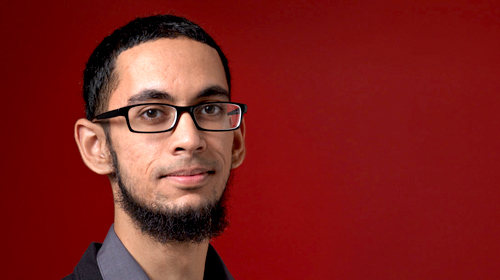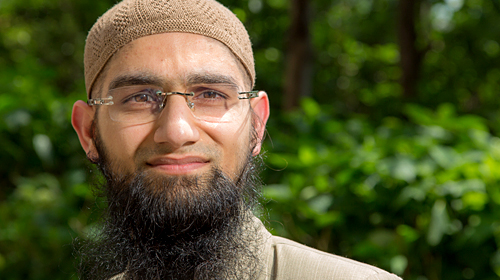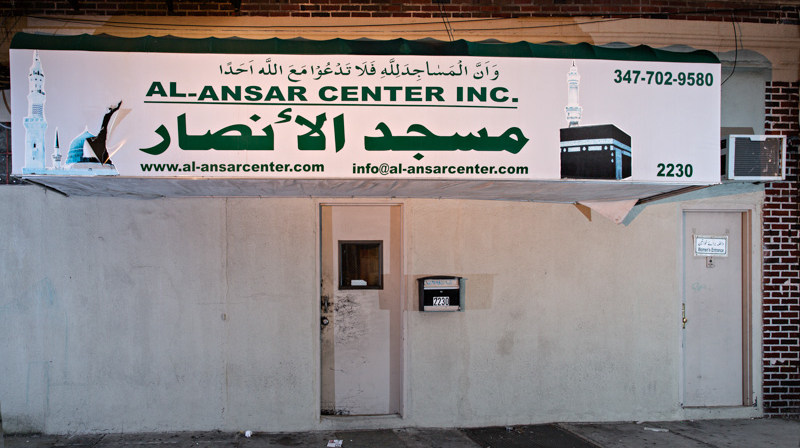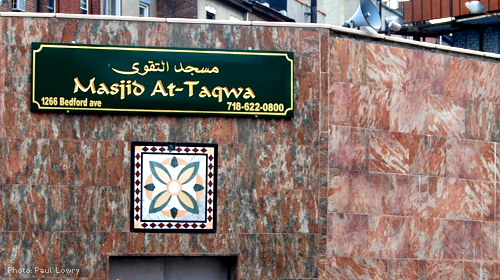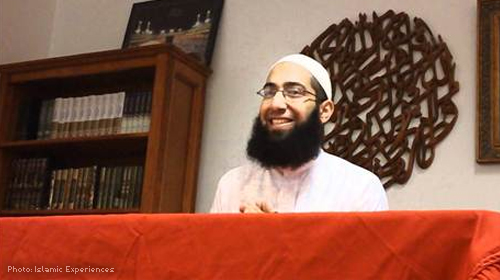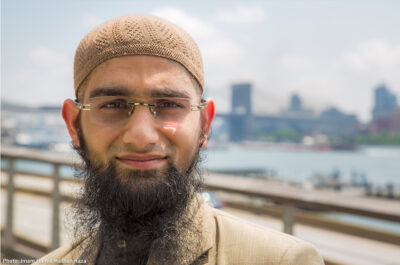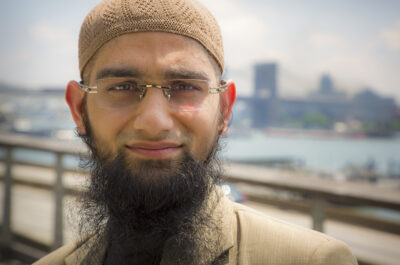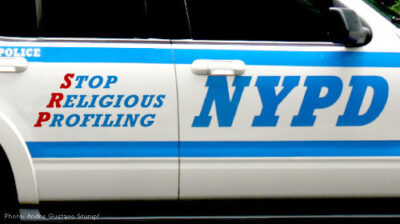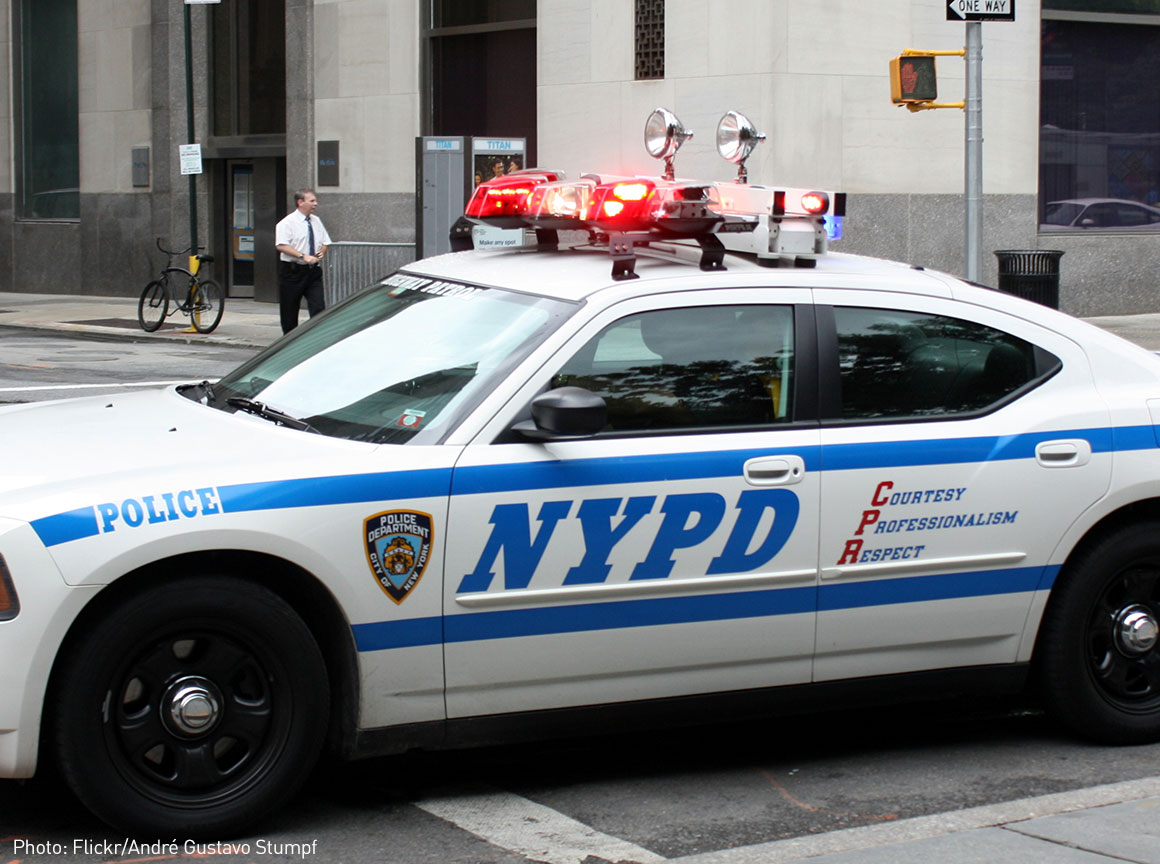
Raza v. City of New York - Legal Challenge to NYPD Muslim Surveillance Program
What's at Stake
The ACLU, the NYCLU, and the CLEAR project at CUNY Law School filed a lawsuit in June 2013 challenging the New York City Police Department's discriminatory and unjustified surveillance of New York Muslims. We were later joined by the law firm of Morrison & Foerster LLP. The plaintiffs include three religious and community leaders, two mosques, and one charitable organization, all of whom were subject to the NYPD's unconstitutional religious profiling program. In January 2016, we announced a proposed settlement in the case with important reforms that include a bar against NYPD investigations on the basis of race, religion, or ethnicity, and the creation of a civilian representative position to oversee rules that safeguard against discriminatory and unjustified NYPD surveillance. That settlement was a joint one, with both the NYPD and the lawyers in Handschu v. Special Services Division, a long-standing class action that challenged the NYPD’s unlawful surveillance of political groups and activists. In October 2016, the federal district court judge presiding over the Handschu case held that he would approve the settlement if the parties agreed to three alterations, which would further strengthen protections. In March 2017, the courts in both Handschu and Raza approved the revised settlement.
Summary
The NYPD's program, dedicated to the total surveillance of Muslims in the greater New York City area, operated under the unconstitutional premise that Muslim beliefs and practices are a basis for law enforcement scrutiny. The NYPD mapped Muslim communities and their religious, educational, and social institutions and businesses in New York City (and beyond). It deployed NYPD officers and informants to infiltrate mosques and other institutions to monitor the conversations of Muslim New Yorkers, including religious leaders, based on their religion without any suspicion of wrongdoing. It conducted other forms of warrantless surveillance of Muslims, including the monitoring of websites, blogs, and other online forums. The results of these unlawful spying activities were entered into NYPD intelligence databases, which amassed information about thousands of law-abiding Americans. A police representative has admitted that the mapping activities did not generate a single lead or resulted in even one terrorism investigation.
The NYPD’s warrantless surveillance of our clients profoundly harmed their religious goals, missions, and practices. It forced religious leaders to censor what they said to their congregants, limit their religious counseling, and record their sermons, for fear that their statements could be taken out of context by police officers or informants. It also diminished attendance at mosques, prompted distrust of newcomers out of concern they are NYPD informants, and prevented the mosques from fulfilling their mission of serving as religious sanctuaries.
Our lawsuit charged that the NYPD, through its discriminatory surveillance program, violated our clients' constitutional right to equal protection, as well as their right to freely exercise their religious beliefs.
The final settlement approved by the court in March 2017 established a number of reforms designed to protect New York Muslims and others from discriminatory and unjustified surveillance. It entailed modification of the Handschu Guidelines, which govern NYPD surveillance of political and religious activity. The reforms include the following:
- Prohibiting investigations in which race, religion, or ethnicity is a substantial or motivating factor;
- Requiring articulable and factual information before the NYPD can launch a preliminary investigation into political or religious activity;
- Requiring the NYPD to account for the potential effect of investigative techniques on constitutionally protected activities such as religious worship and political meetings;
- Limiting the NYPD’s use of undercovers and confidential informants to situations in which the information sought cannot reasonably be obtained in a timely and effective way by less intrusive means;
- Putting an end to open-ended investigations by imposing presumptive time limits and requiring reviews of ongoing investigations every six months;
- Installing a Civilian Representative within the NYPD, with the power and obligation to ensure all safeguards are followed and to serve as a check on investigations directed at political and religious activities;
- Empower the representative to report to the court at any time concerning violations of the Handschu Guidelines;
- Require the mayor to seek court approval before abolishing the position of civilian representative; and
- Removing from the NYPD website the Radicalization in the West report, which justified discriminatory surveillance, and affirming that the report is not and will not be relied upon to open or prolong NYPD investigations.
Legal Documents
-
03/20/2017
Order Approving Stipulation of Settlement -
-
03/20/2017
Exhibit A (Revised Handschu Guidelines) -
03/20/2017
Exhibit B (Handschu Court opinion approving Revised Handschu Guidelines)
Exhibit A (Revised Handschu Guidelines)Date Filed: 03/20/2017
Court: District Court (E.D.N.Y.)
Exhibit B (Handschu Court opinion approving Revised Handschu Guidelines)Date Filed: 03/20/2017
Court: District Court (E.D.N.Y.)
-
03/20/2017
-
03/19/2017
Letter to Judge Chen -
-
03/19/2017
Updated Letter of Joint Stipulation -
03/19/2017
Exhibit A (Revised Handschu Guidelines) -
03/19/2017
Exhibit B (Handschu Court opinion approving Revised Handschu Guidelines)
Updated Letter of Joint StipulationDate Filed: 03/19/2017
Court: District Court (E.D.N.Y.)
Exhibit A (Revised Handschu Guidelines)Date Filed: 03/19/2017
Court: District Court (E.D.N.Y.)
Exhibit B (Handschu Court opinion approving Revised Handschu Guidelines)Date Filed: 03/19/2017
Court: District Court (E.D.N.Y.)
-
03/19/2017
-
03/06/2017
Settlement Letter to Judge -
-
03/06/2017
Exhibit A (Revisions to Handschu Guidelines)
Exhibit A (Revisions to Handschu Guidelines)Date Filed: 03/06/2017
Court: District Court (E.D.N.Y.)
-
03/06/2017
-
10/28/2016
Handschu Court Ruling on Proposed Revisions to Handschu Guidelines -
01/07/2016
Motion for Entry of Settlement Stipulation and Order -
01/07/2016
Settlement Stipulation and Order -
-
01/07/2016
Exhibit A: Proposed Modified Handschu Guidelines
Exhibit A: Proposed Modified Handschu GuidelinesDate Filed: 01/07/2016
Court: District Court (E.D.N.Y.)
-
01/07/2016
-
08/31/2015
Status Report and Joint Request for Extension of Stay -
07/31/2015
ACLU Status Letter -
06/30/2015
Joint Motion to Modify Confidentiality Order -
06/30/2015
Transcript of Civil Cause for Discovery Conference Held on July 9, 2014 -
06/19/2015
Joint Status Report -
08/15/2014
Joint Letter Concerning Settlement Process Stay and Disclosure Protections -
08/15/2014
Defendants' Letter Motion for Reconsideration of the Court's Ruling on Field-Level Custodians -
08/08/2014
Plaintiffs' Reply Brief Concerning Interrogatories Challenged on Grounds of First Amendment Privilege and Retroactive Justification -
-
08/08/2014
Declaration of Ashley Gorski in Support of Plaintiffs' Reply Brief Concerning Defendants' Challenged Interrogatories
Declaration of Ashley Gorski in Support of Plaintiffs' Reply Brief Concerning Defendants' Challenged InterrogatoriesDate Filed: 08/08/2014
Court: District Court (E.D.N.Y.)
-
08/08/2014
-
08/01/2014
Defendants' Memorandum of Law in Opposition to Plaintiffs' Objections to Defendants’ Interrogatories -
-
08/01/2014
Declaration of Cheryl L. Shammas in Support of Defendants' Memorandum of Law in Opposition to Plaintiffs' Objections to Interrogatories -
08/01/2014
Exhibits
Declaration of Cheryl L. Shammas in Support of Defendants' Memorandum of Law in Opposition to Plaintiffs' Objections to InterrogatoriesDate Filed: 08/01/2014
Court: District Court (E.D.N.Y.)
ExhibitsDate Filed: 08/01/2014
Court: District Court (E.D.N.Y.)
-
08/01/2014
-
08/01/2014
Joint Motion for an Extension of Time to Complete Document Discovery -
07/22/2014
First Amended Stipulation and Protective Order for the Production and Exchange of Confidential Materials -
07/16/2014
Joint Stipulations Concerning Plaintiffs’ Allegations of Economic Harm -
07/16/2014
Minute Entry re: Plaintiffs' Proposed Stipulations -
07/10/2014
Minute Entry re: Plaintiffs' Document Request and Outstanding Discovery Issues -
07/08/2014
Plaintiffs' Letter Seeking to Compel Defendants to Collect Electronically Stored Information from NYPD Field Personnel -
06/27/2014
Defendants' Letter Motion for Protective Order to Shield Field Officers from Designation as Custodians -
06/18/2014
Plaintiffs' Letter Challenging Defendants' Redactions and Designations Pursuant to the Protective Order -
-
03/31/2014
Declaration of Mariko Hirose in Support of Plaintiffs' Supplemental Briefing Concerning Disputed Discovery Requests
Declaration of Mariko Hirose in Support of Plaintiffs' Supplemental Briefing Concerning Disputed Discovery RequestsDate Filed: 03/31/2014
Court: District Court (E.D.N.Y.)
-
03/31/2014
-
06/08/2014
Defendants' Memorandum of Law in Further Opposition to Plaintiffs' Briefing Concerning Disputed Discovery Requests -
04/21/2014
Defendants' Memorandum of Law in Opposition to Plaintiffs' Briefing Concerning Disputed Discovery Requests -
03/31/2014
Plaintiffs' Supplemental Briefing Concerning Disputed Discovery Requests -
03/24/2014
Joint Document Production Schedule -
03/21/2014
Letter Preserving Protective Order Appeal -
03/20/2014
Stipulation and Protective Order for the Production and Exchange of Confidential Materials -
12/26/2013
Defendants' Letter re Status of Confidentiality Stipulation & Discovery Process -
11/22/2013
Memorandum & Order re: Plaintiffs' Motion for Expedited Discovery -
11/07/2013
ACLU's Reply Memorandum in Support of Their Motion for Expedited Discovery -
11/01/2013
ACLU's Letter Requesting an Enlargement of Page Limit for Reply in Support of Motion for Expedited Discovery -
10/30/2013
Defendants' Brief in Opposition to ACLU's Motion for Expedited Discovery -
-
10/30/2013
Declaration of Alexis L. Leist in Support of Defendants' Opposition to ACLU's Motion for Expedited Discovery -
10/30/2013
Declaration of David Cohen in Support of Defendants' Opposition to ACLU's Motion for Expedited Discovery
Declaration of Alexis L. Leist in Support of Defendants' Opposition to ACLU's Motion for Expedited DiscoveryDate Filed: 10/30/2013
Court: District Court (E.D.N.Y.)
Declaration of David Cohen in Support of Defendants' Opposition to ACLU's Motion for Expedited DiscoveryDate Filed: 10/30/2013
Court: District Court (E.D.N.Y.)
-
10/30/2013
-
10/11/2013
Defendants' Letter Requesting Extention of Time to File Opposition Response to ACLU's Motion for Expedited Discovery -
10/08/2013
Memorandum of Law in Support of ACLU's Motion for Expedited Discovery -
10/08/2013
ACLU's Notice of Motion for Expedited Discovery -
-
10/08/2013
Declaration of Patrick Toomey, Esq. in Support of ACLU's Request for Order to Show Cause Permitting Expedited Discovery in Support of a Preliminary Injunction
Declaration of Patrick Toomey, Esq. in Support of ACLU's Request for Order to Show Cause Permitting Expedited Discovery in Support of a Preliminary InjunctionDate Filed: 10/08/2013
Court: District Court (E.D.N.Y.)
-
10/08/2013
-
09/26/2013
Defendants' Letter on the Status of a Proposed Confidentiality Stipulation -
09/19/2013
Defendants' Letter in Opposition to ACLU's Request for Pre-Motion Conference for Expedited Discovery -
09/18/2013
ACLU's Letter Requesting Change in Date for Pre-Motion Conference -
09/12/2013
ACLU Letter in Anticipation of Motion for Preliminary Injunction, Requesting Pre-Motion Conference -
09/11/2013
ACLU’s Response Letter on Bifurcating Discovery -
09/10/2013
Defendants' Letter on Bifurcating Discovery -
09/09/2013
Defendants' Answer -
07/05/2013
Defendants' Letter to the Court Requesting a 60-Day Extention of Time to Answer ACLU's Complaint -
07/05/2013
ACLU's Letter Objecting to Defendants' Request for a 60-Day Extention of Time to Answer Complaint -
06/18/2013
Complaint
Date Filed: 03/20/2017
Court: District Court (E.D.N.Y.)
Date Filed: 03/19/2017
Court: District Court (E.D.N.Y.)
Date Filed: 03/06/2017
Court: District Court (E.D.N.Y.)
Date Filed: 10/28/2016
Court: District Court (E.D.N.Y.)
Date Filed: 01/07/2016
Court: District Court (E.D.N.Y.)
Date Filed: 01/07/2016
Court: District Court (E.D.N.Y.)
Date Filed: 08/31/2015
Court: District Court (E.D.N.Y.)
Date Filed: 07/31/2015
Court: District Court (E.D.N.Y.)
Date Filed: 06/30/2015
Court: District Court (E.D.N.Y.)
Date Filed: 06/30/2015
Court: District Court (E.D.N.Y.)
Date Filed: 06/19/2015
Court: District Court (E.D.N.Y.)
Date Filed: 08/15/2014
Court: District Court (E.D.N.Y.)
Date Filed: 08/15/2014
Court: District Court (E.D.N.Y.)
Date Filed: 08/08/2014
Court: District Court (E.D.N.Y.)
Date Filed: 08/01/2014
Court: District Court (E.D.N.Y.)
Date Filed: 08/01/2014
Court: District Court (E.D.N.Y.)
Date Filed: 07/22/2014
Court: District Court (E.D.N.Y.)
Date Filed: 07/16/2014
Court: District Court (E.D.N.Y.)
Date Filed: 07/16/2014
Court: District Court (E.D.N.Y.)
Date Filed: 07/10/2014
Court: District Court (E.D.N.Y.)
Date Filed: 07/08/2014
Court: District Court (E.D.N.Y.)
Date Filed: 06/27/2014
Court: District Court (E.D.N.Y.)
Date Filed: 06/18/2014
Court: District Court (E.D.N.Y.)
Date Filed: 06/08/2014
Court: District Court (E.D.N.Y.)
Date Filed: 04/21/2014
Court: District Court (E.D.N.Y.)
Date Filed: 03/31/2014
Court: District Court (E.D.N.Y.)
Date Filed: 03/24/2014
Court: District Court (E.D.N.Y.)
Date Filed: 03/21/2014
Court: District Court (E.D.N.Y.)
Date Filed: 03/20/2014
Court: District Court (E.D.N.Y.)
Date Filed: 12/26/2013
Court: District Court (E.D.N.Y.)
Date Filed: 11/22/2013
Court: District Court (E.D.N.Y.)
Date Filed: 11/07/2013
Court: District Court (E.D.N.Y.)
Date Filed: 11/01/2013
Court: District Court (E.D.N.Y.)
Date Filed: 10/30/2013
Court: District Court (E.D.N.Y.)
Date Filed: 10/11/2013
Court: District Court (E.D.N.Y.)
Date Filed: 10/08/2013
Court: District Court (E.D.N.Y.)
Date Filed: 10/08/2013
Court: District Court (E.D.N.Y.)
Date Filed: 09/26/2013
Court: District Court (E.D.N.Y.)
Date Filed: 09/19/2013
Court: District Court (E.D.N.Y.)
Date Filed: 09/18/2013
Court: District Court (E.D.N.Y.)
Date Filed: 09/12/2013
Court: District Court (E.D.N.Y.)
Date Filed: 09/11/2013
Court: District Court (E.D.N.Y.)
Date Filed: 09/10/2013
Court: District Court (E.D.N.Y.)
Date Filed: 09/09/2013
Court: District Court (E.D.N.Y.)
Date Filed: 07/05/2013
Court: District Court (E.D.N.Y.)
Date Filed: 07/05/2013
Court: District Court (E.D.N.Y.)
Date Filed: 06/18/2013
Court: District Court (E.D.N.Y.)
Press Releases
Court Releases First Annual Report on NYPD Reforms after Landmark Muslim Surveillance Settlement
Second and Final Judge Approves Settlement on NYPD Muslim Surveillance
Revised Settlement Enhances Protections From Discriminatory NYPD Surveillance of American Muslims
Judge Calls for Additional Safeguards in NYPD Surveillance Rules
Landmark Settlement Protects American Muslims From Discriminatory NYPD Surveillance
NYPD Shuts Unit That Mapped Muslim Communities
